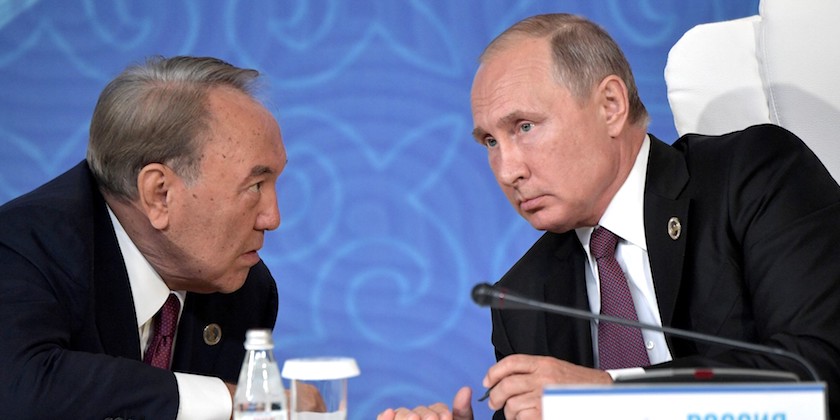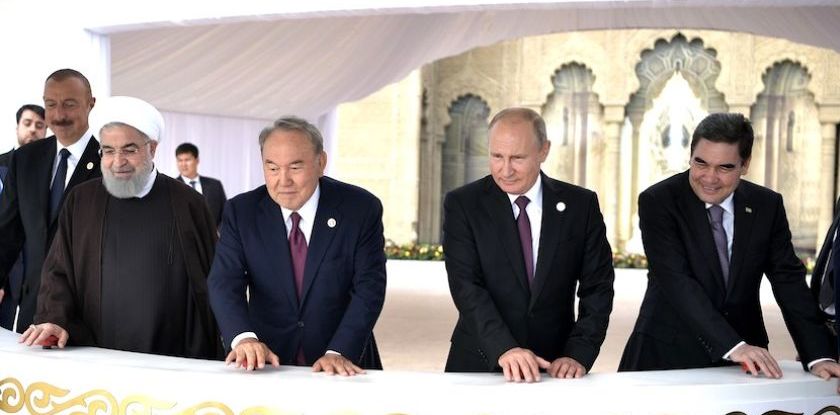The Caspian Sea’s legal status has finally been determined. It is neither a sea nor a lake but a body of water. And, as the heads of the five Caspian states have decided, now the Caspian game is to be played by the new rules. Whose?
On August 12, in the Kazakhstan city of Aktau, the heads of the “Caspian Five” signed the Convention on the legal status of the Caspian Sea. This document has been in development for more than twenty years, since 1996 to be precise. After the disintegration of the USSR, new subjects of the international legal system had appeared, i.e. the former Soviet republics. This demanded a new demarcation of the Caspian among the five countries – Russia, Kazakhstan, Turkmenistan, Azerbaijan, and Iran. The difficulty in determining the status of the Caspian lied in the fact that these countries were unable to reach an agreement on whether the Caspian was a lake or a sea since the two had different standings in the international legal system. The signed Convention establishes the Caspian Sea as a “drainless water body” which gives it a special status.

Political science expert, Head of the Central Asia and Kazakhstan Department of the CIS Countries Institute Andrey Grozin comments on the new status of the Caspian and on the Aktau meeting.
- Andrey Valeryevich, the leaders of the five Caspian states have finally signed the Convention on the legal status of the Caspian Sea. Putin called it “an epoch-making event” while Nazarbayev said the Convention was the “constitution” of the Caspian. What do you think of this document?
— It is indeed a big historic event since the Convention creates the basic conditions for solving a number of the problems tied to the Caspian. Note that, up until recently, the signing of such a document seemed impossible, to me as well. Yes, at the fourth summit in Astrakhan, they said that the development of this document had entered the final stage so, by the next summit, the parties would be able to sign it. However, the Russian experts that specialize in the Caspian issues were skeptical. No one believed that, given the current developments, the document could be finalized and signed. Therefore, when it did happen at the fifth summit in Aktau, the enthusiastic comments started flowing like water.
However, we must understand that the Convention is only the basis for solving the rest of the problems. It does not have too many articles. What is important is that it introduces the 15-mile zone of the territorial waters and the additional 10-mile zone for fishery. It also determines that only the Caspian states have the right for the military presence on the water.
In my opinion, the most important thing is that all he five states have reached an agreement that the Caspian Sea is a special drainless water body so neither the 1982 International Maritime Law Convention nor the lakes division precedents are applicable when dealing with it. In other words, the Convention signed in Aktau gives a special status to the Caspian Sea. Thanks to it, there is now a possibility to solve the problems accumulated during all the long years of the negotiations. Among other things, it includes the issues of the concrete territorial sectoral division and the right to extract in the national sectors.
- The Convention does not specify what percentage of the Caspian Sea area which country receives but the media is already revealing all kinds of data…
— These are just speculations. There have been no official announcements as to the territories and the borders across the Caspian Sea water area. This issue is on the next negotiations’ agenda. Although, for Astana, this is quite a comfort zone since the problems of the demarcation of the North part of the Caspian were resolved long ago. The territorial and economic regime in the Caspian has been working to Russia’s, Azerbaijan’s, and Kazakhstan’s satisfaction for more than ten years and will not be reviewed with the signing of the Convention. They have agreed on all the frontier issues.
The Convention, in my opinion, serves as the base document for the South Caspian neighbors to follow the same (albeit their own special) path. In particular, I am talking about the problems between Azerbaijan and Turkmenistan tied to the unresolved issues of the hydrocarbon deposits, the disputes on the ownership of certain sectors between Turkmenistan and Iran and between Iran and Azerbaijan. These problems are not resolved in the Convention; however, it lays the basis for solving them.
And here, the position of Iran to whom it would be advantageous to establish the status of the Caspian Sea as a lake is particularly important. If the Caspian was rendered a lake, then all the Caspian states would have received the equal 20% shares according to the international law. By the way, Iran had always approached the issue of the Caspian division with much creativity. For example, it suggested to divide everything on an equal basis or to create a condominium so that all the neighbors would be able to sail without restrictions and to extract the resources (both hydrocarbons and bioresources) together and for the common good. So, today, some of the Iranian oppositionist parliamentarians are not pleased with the signing of the Convention. They say the country’s leaders have made a mistake. Because Iran, according to the previous agreements with the USSR, was to get one half of the Caspian and now it stands to gain only 11%. But these statements are clearly of the populist nature since, as of the moment, no one knows who will get what.
- Why was the Convention finally signed? To think, they had been arguing about the division of the Caspian for more than 20 years and then suddenly reached a consensus. What had happened to make it possible?
- The political will and the geopolitical situation that has seriously changed during the past two years are responsible for bringing the long negotiations process to the end. Here I agree with those experts who say that Mr. Trump and his policies deserve a special thank you note for that. The pressure that the US has been putting on Iran is one of the major factors that forced Teheran to assume a more reasonable position in the Caspian negotiations.
- What kind of pressure are you talking about?
Trump’s unilateral exit from the Iranian nuclear deal and his attempt to shake loose the situation in Islamic Republic causing a social protest via the new sanctions are, in my opinion, the factors that have finally forced Iran to assume a more realistic position and to become more pliable in the Caspian status negotiations.
For Moscow, the Trump factor has become the driving force for the signing of the Convention. The military and strategic concerns are of the dominant nature for the Kremlin while the building of the Trans-Caspian pipeline bypassing Russia is a second- (if not third-) order issue. What is important for Moscow and Teheran is that, after the signing of the Convention, the Caspian region is to remain geopolitically closed for any external influence.
- Have there been attempts to exert such influence?
As any military expert will tell you, it is hard to imagine the US or NATO ships sailing across the Caspian. The Caspian is quite a closed region that can be entered by ship only via the system of channels.
But, if you recall Bismarck’s famous saying, politics is the art of the possible. And there have been possibilities. It is for this reason that they made such song and dance about the US special cargo transit to Afghanistan via Kazakhstan ports Aktau and Kuryk. And there had been many speculations around the possibility of the extra-regional military’s appearance at the Apsheron peninsula in Turkmenistan. Remember they said that Ashkhabad had practically agreed upon letting the Americans onto its territory?..
Perhaps the Russian Federation and Iran deemed it possible that the Americans might appear in the Caspian? Not necessarily within the framework of the naval facilities since it would be an extreme and hardly-feasible option. But the appearance of the training, logistics, retraining, monitoring, or sturgeon-saving centers via the Pentagon programs would have been quite possible. But, after the signing of the Convention, the possibilities for the appearance of the extra-regional players in the military uniform in the Caspian have been significantly narrowed.
Of course, the signing of the Convention does not mean that the geopolitical confrontations in the region will end. The fight will continue, and the Iranian and the Russian adversaries in the Western elites will not automatically abandon the idea of somehow infiltrating the region. Therefore, from the geopolitical and geostrategic standpoint, the signing of the Convention is just a step in the fight for the dominance in the region and the prevention of the appearance of the alien pieces on this square of the Eurasian chessboard.

- So, Russia and Iran signed the Convention due to the geopolitical reasons. Azerbaijan and Turkmenistan did it in the hopes to build the Trans-Caspian pipeline and not only that. What do you think Kazakhstan’s reasons were?
For the young Caspian states, the Convention’s attractiveness lies precisely in the fact that it can theoretically widen the possibilities for attracting the Western and the non-Western businesses to the Caspian economic projects. These must not necessarily be some large-scale pipeline-building initiatives. There are the projects to widen the via-Caspian transit. There are the concessionary shipping traffic regimes that work to the advantage of the states interested in the development of the regional economy.
And besides, Russia, if we are to recall Putin’s words, has demonstrated that its Caspian interests lie beyond the geopolitics and geostrategy. On one hand, they have already started the transfer of the warship flotilla’s main base to Kaspiysk and, on the other hand, the Russian President has specifically underscored the topic of constructing a new deep-water port on the Caspian Sea. Thus, the Kazakhstan, Turkmenistan, and Azerbaijan activities in the Caspian as far as the building of the transportation and logistics facilities are concerned are now combined with the Russian efforts. This, in its turn, implies that, from the transportation and logistics potential standpoint, the Caspian region’s importance will grow.
Here, by the way, it is appropriate to recall the Caspian interests of the People’s Republic of China. I think Beijing had been following the Aktau summit preparations with as much interest as Washington and the “Caspian Five”. Because the projects associated with the “One Belt, One Road” initiative allow for the possibility to widen the transportation and logistics capabilities in the Caspian. These projects need the clarity of the Caspian status that it had previously been lacking. The Caspian regions are now open for the international business.
In conclusion, I would like to note that the signing of the Convention on the Caspian Sea’s legal status is just one of the final steps in the longstanding negotiations process. It will serve as a helping hand that will allow the Caspian states to fully take advantage of this in every way remarkable region’s potential.




